Photo by Kevin Delvecchio on Unsplash
In our day and age of information explosion, there is free competition of fallacies and solid truth dished out and simultaneously available, in equal real time, speed, and volume. This is especially true with concerns about daily living and issues closest to our hearts: our bodies, intimate relationships, spirituality, and family. Social media and popular networks are bursting with information on food, healthy living, sports, enhancing beauty, intimacy, family living, and parenting.
Fallacies are mistaken beliefs or false notions based on unsound arguments and therefore are deceptive and misleading. Parents are most vulnerable to fallacies. Because of easy access, they gather all information, not leaving any stone unturned, trying everything in their quest to give the best to their children. Out of so many fallacies on parenting, these five, I believe, are relevant to Filipino parenting in contemporary society. For each fallacy, I propose counter perspectives distilled from biblical principles, from child development and parenting theories, and from my experience as a mother.
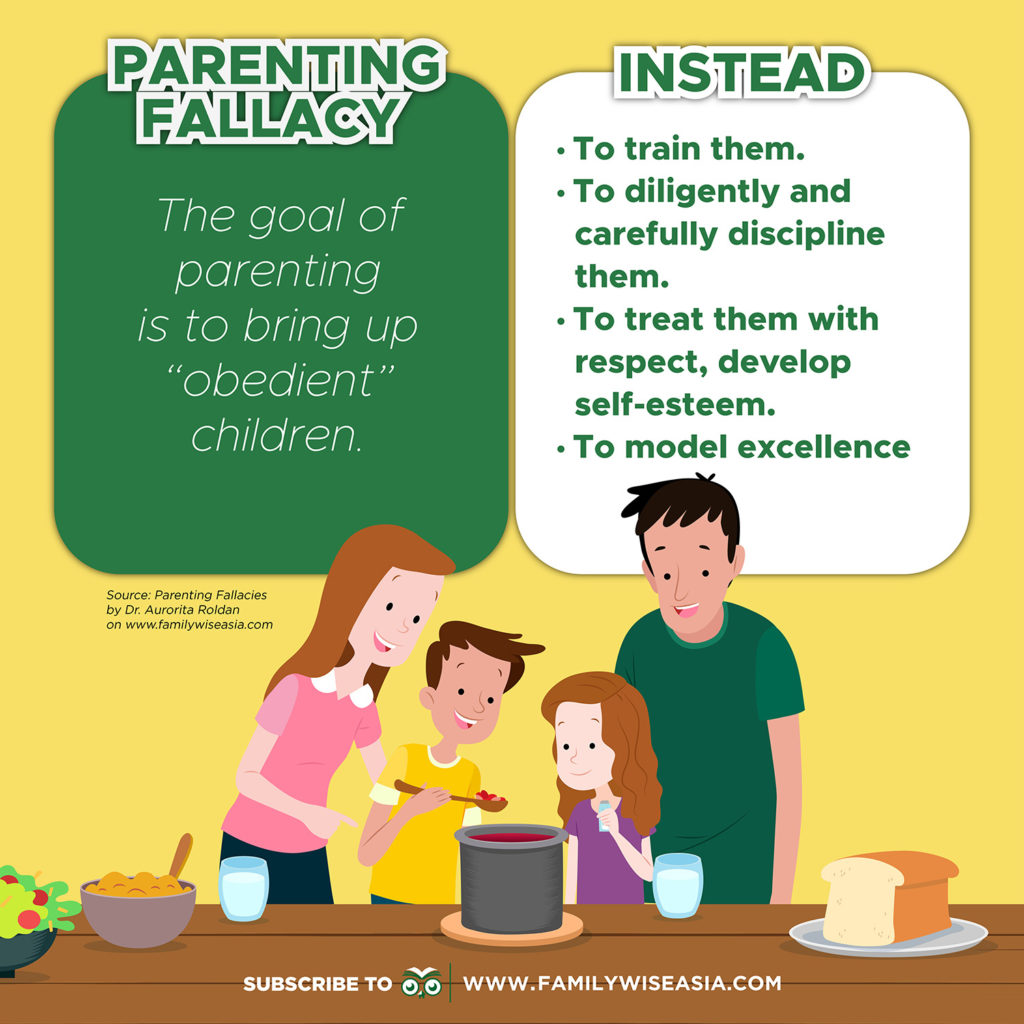
Fallacy 1. The goal of parenting is to bring up “obedient” children. Obedience or pagiging masunurin is a most celebrated trait coveted by Filipino parents for their children, then and now. Obedient children become favorites, most praised and admired in families and Filipino culture as a whole. But in the Bible, obedience is actually an instruction given to children to follow, and not to parents. Instead, the more explicit instructions given to parents are actually the following:
- To train them. “Train up a child in the way he should go, (because) even when he is old, he shall not depart from it” (Prov 22:6). This requires that parents have clear goals for their children. Having clear goals rooted on solid values give parents direction and allows for consistency in guiding and leading them. Values give form to attitudes, character formation, and direction for ambitions in life to pursue. These also help strengthen their resolve in standing up for what is right and just in the eyes of God.
- To diligently and carefully discipline them. Do not pity them when they do wrong: “He who withholds his rod hates his son, but he who loves him disciplines him gently” (Prov. 13:24). Among the misplaced kindness of Filipino parents is appeasing children who misbehave and/or willfully hurt others. Discipline comes in different forms — spanking, isolation, deprivation, etc. — and should fit the offense and the child’s age (developmental level). The verse plainly teaches parents not to pity children, but instead, to correct their wrong — or they will be confused, be easily misled or not be well grounded in life.
- To treat them with respect, develop self-esteem. Sometimes, parents wonder why — despite all the monitoring they do of their children to make sure they do what is right — they end up to be the opposite. Self-esteem is what makes children stand up for what they believe is righteous and just while relating to peers. Self-esteem is developed by appreciating them, allowing them to express their thoughts, listening to them and respecting them (Mark 10:13-16).
- To model excellence in loving the Lord our God (as well as the fear of displeasing or disobeying Him) and thenteach this to them (Deut. 6:5-9; 1 Tim :3, 5). Like it or not, parents are powerful role models to their children. This is often the reason why we refer back to the parents of what become of their children.
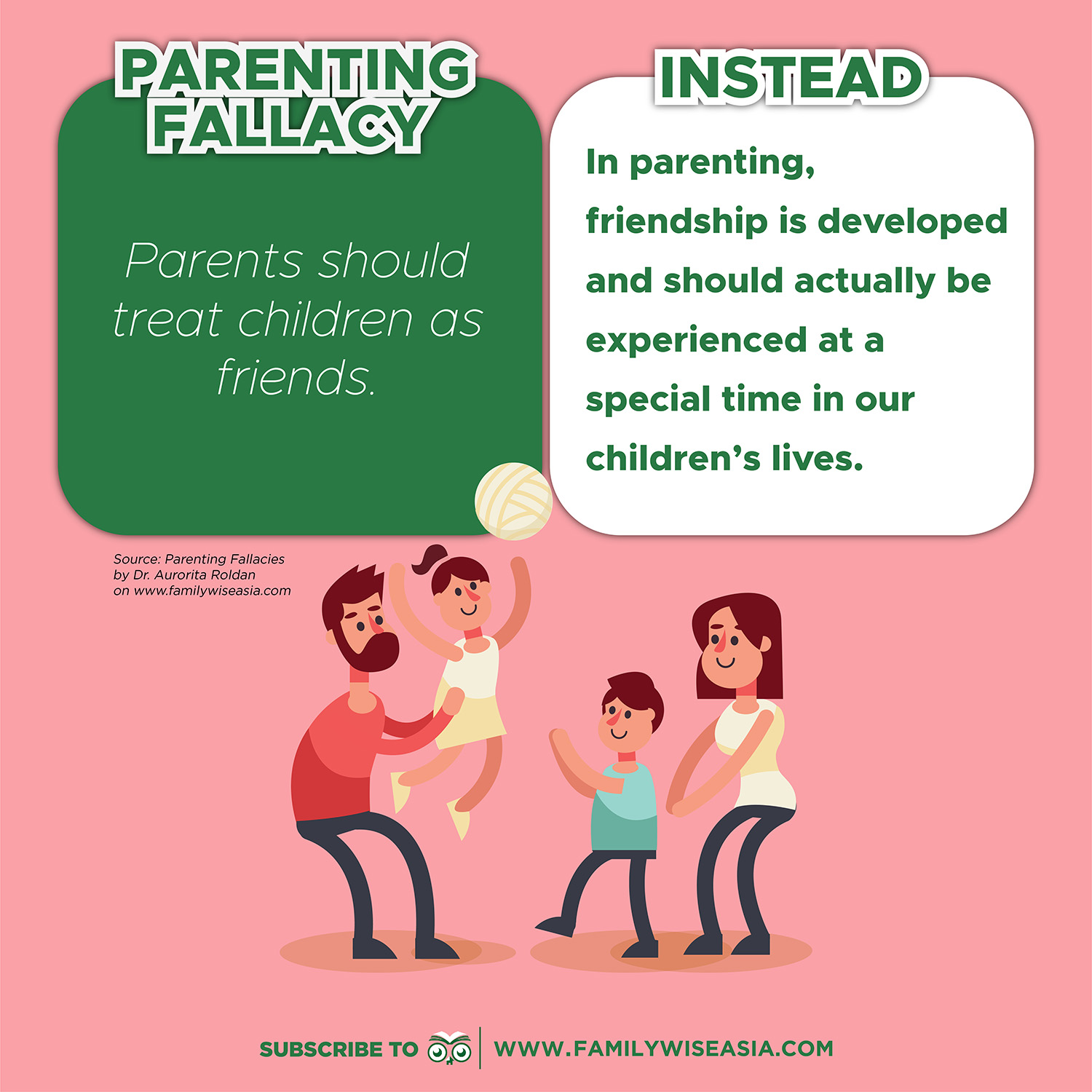
Fallacy 2. Parents should treat children as friends. This is a contemporary fallacy that seems to be a reaction to the first fallacy. Friendship is among the deepest and lasting relationships we develop with a fellow human being. But in parenting, friendship is developed and should actually be experienced at a special time in our children’s lives. During their infancy, we provide special care for our children who are fully dependent on us. In the preschool years, commonly called the formative years, parents are to relate with their children as wielding authority. Children need to learn what it means to have an authority figure. This should slowly loosen as they grow. It is during their adolescent years when friendship with parents start to really blossom, transforming it into a fully ripened fruit when the child becomes an adult. The trust required for this friendship began when the children were born and developed through the many years of experiencing the security and love and care of their parents.
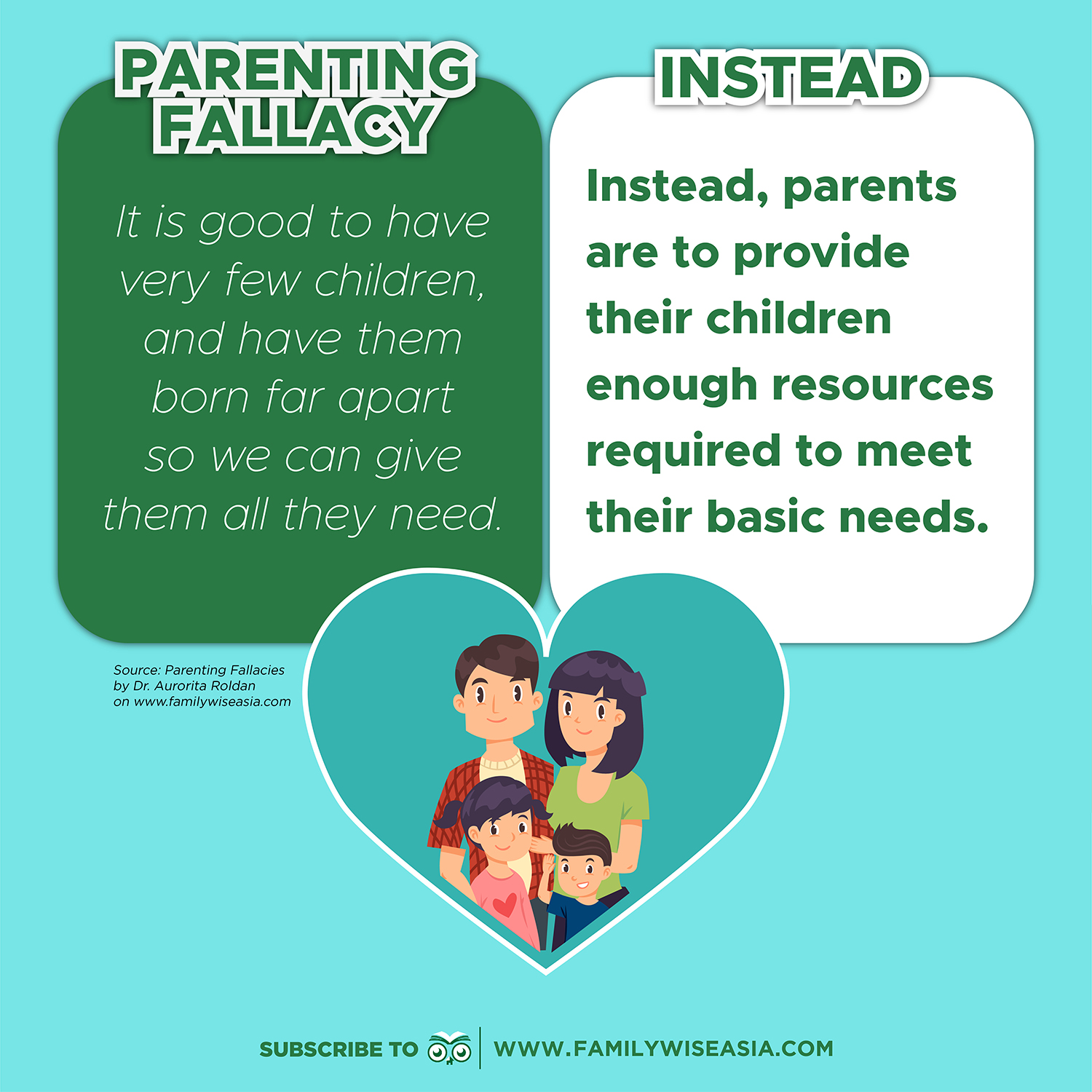
Fallacy 3. It is good to have very few children, and have them born far apart so we can give them all they need. Family matters are assumed to be personal, therefore personal choice and pleasure is acceptable. The number of children and their parity (space of birthing them) are some aspects of family life where decision is based on some assumptions and personal goals set by couples for themselves, though seldom prayed for. The usual reason given by parents is that they want to give the best to their children or that they want to give enough time and attention to each of them. The statement is a fallacy because parents are not supposed to give all the things and all attention they think their children need. Instead, parents are to provide their children enough resources required to meet their basic needs that would wholly, fully develop them and adequately prepare them to fully function as unique individuals, like Jesus in Luke 2:52 where it was said that He grew in stature (physically), in wisdom (mentally), in favor with God (spiritually) and in favor with fellow man (psycho-socially). When brought up the right way, children benefit much from having siblings, born not too far part from each other. Science and the efficacy of medicine may be used to decide on the number and spacing of children we choose to have, but this has to be done in an unselfish, prayerful way, consulting God each step of the way. Except the Lord build the house, they labor in vain who build it(Psalm 127:1a).
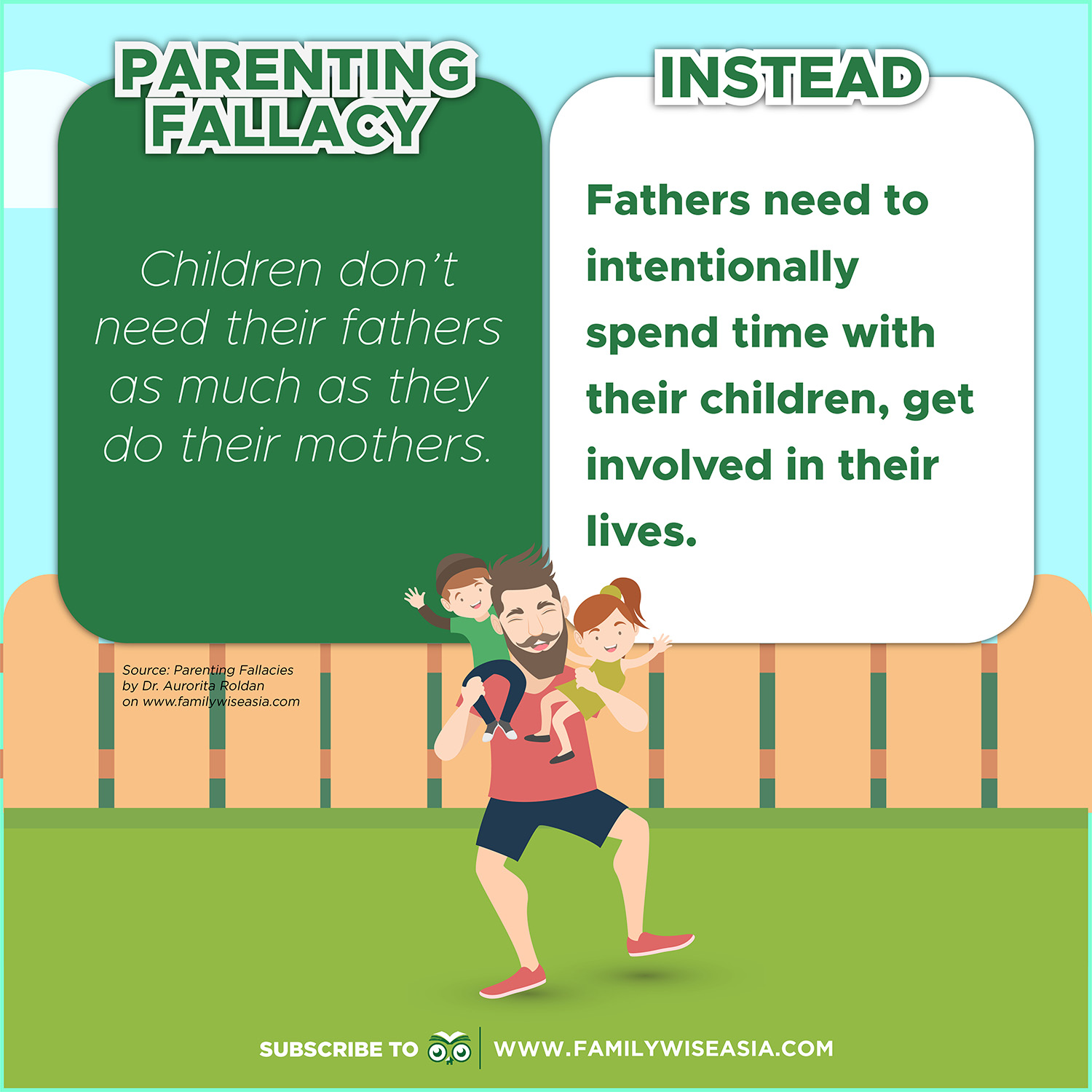
Fallacy 4. Children don’t need their fathers as much as they do their mothers. Wrong. Children, for their full and healthy development, need their fathers as much as their mothers. This fallacy was borne from the biological reality that mothers bear children and naturally give them their food (milk) upon birth. During this period, fathers continue to engage in economic pursuits to attend to the family’s requirements. But the problem slowly creeps in when this “arrangement” just goes on and on and on, more often, unconsciously until it becomes the lifestyle of the family where the mother gets to be the one mainly responsible for, then solely involved with, the children. The “good mother” singlehandedly attends to her children’s needs, knows “everything” about them, anticipates or preempts their needs. This stretches even to gatekeeping, resulting to further alienation of fathers from their children. This scenario is common amongst Filipino families with overperforming mothers and uninvolved fathers when it comes to parenting. Fathers need to intentionally spend time with their children, get involved in their lives. Filipino mothers need to give space, develop tolerance and patience, allowing fathers to participate in caring for their children.
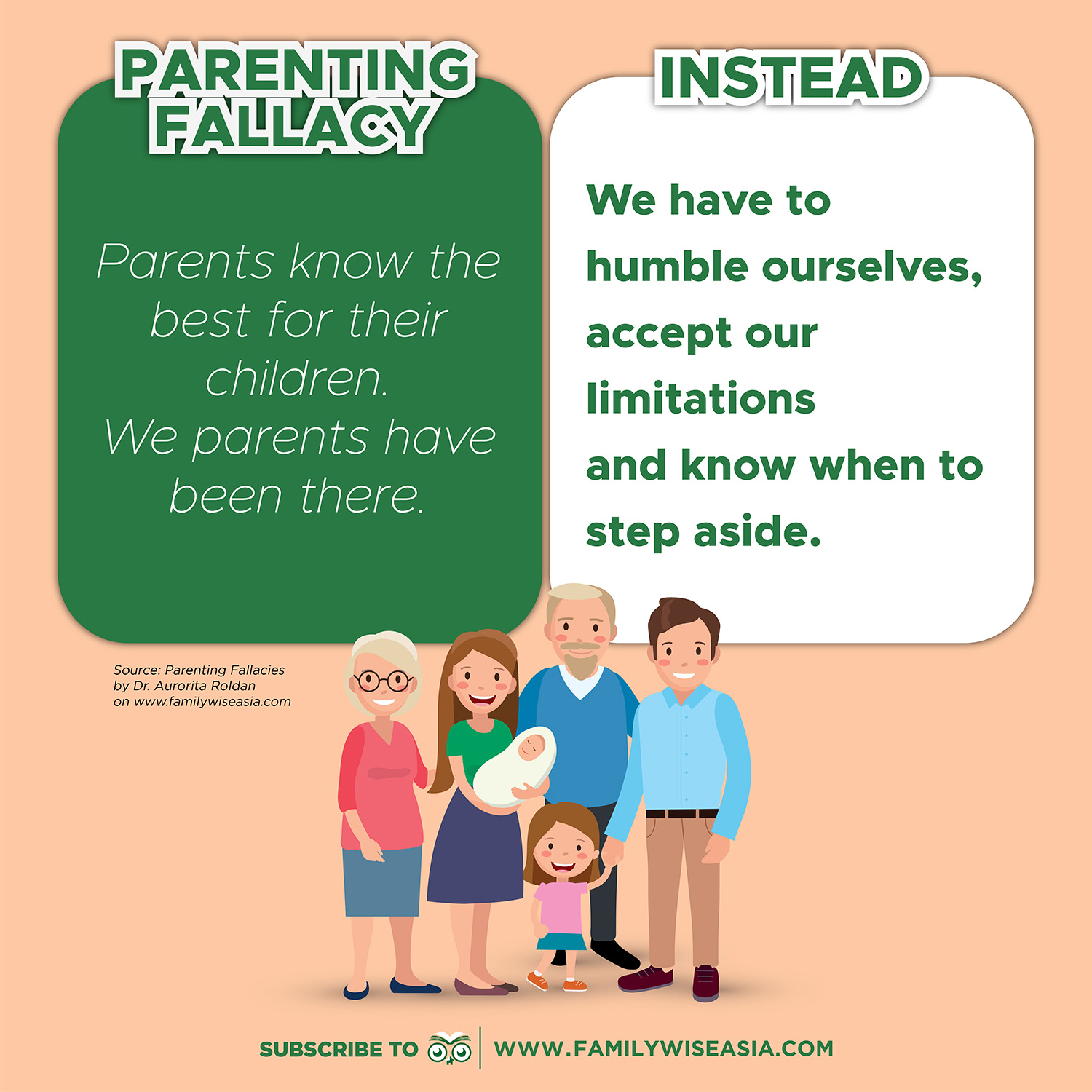
Fallacy 5. Parents know the best for their children. We parents have been there from our children’s birth. We have cared for them and nurtured them practically all their lives. Consequently, we assume we know what is best for them. Since we have invested so much in them, we even sometimes think we have the right to decide on what they should do with their lives. Being human, we parents, have to stop, put things in perspective, accept our finiteness, and depend on God. We have to humble ourselves, accept our limitations, know when to step aside and allow God to move in our children’s lives.
Like us, our children were created for a purpose. Our task is to prepare them and equip them so that God’s purpose may be realized in their lives. This also means that we can be more relaxed in our parenting and less worried about our many mistakes. Our God is sovereign and we may expect His perfect will to be realized in our children’s lives if we remain faithful to our own calling. “You are worthy, our Lord and God, to receive glory and honor and power, for you created all things, and by your will they were created and have their being” (Rev 4:11).

Dr. Aurorita Roldan is the dean of the College of Home Economics at the University of the Philippines in Diliman, where she has also been serving as faculty of the Department of Family Life and Child Development for almost 35 years now. She holds a doctorate degree in Psychology (Clinical) from UP Diliman, and obtained her master’s degree in Development Studies (Women and Development) from The Hague, The Netherlands. Dr. Yoyit and her husband of 40 years, missionary pastor Marlon Roldan, have been blessed with three grown children and six grandchildren.
Related Posts
-
Parenting the Digital Generation
Being connected through technology may make sense, but the human heart will always long for…
-
Rainy Season Reminders
Make sure that you and your family stay safe and protected this rainy season!
-
Parenting the Digital Generation
Being connected through technology may make sense, but the human heart will always long for…



